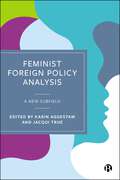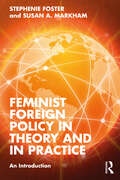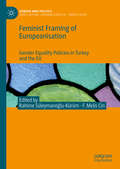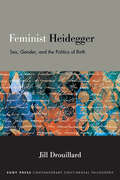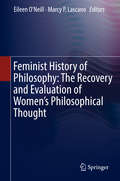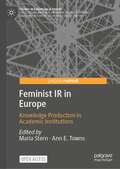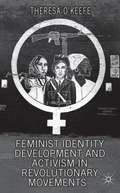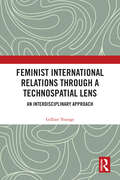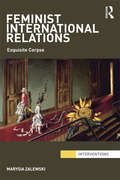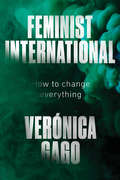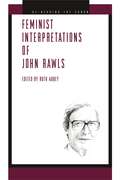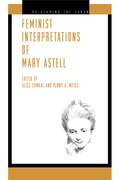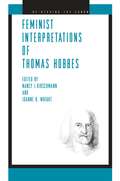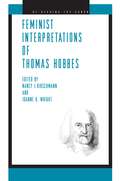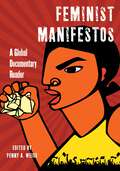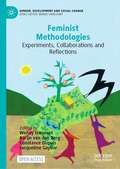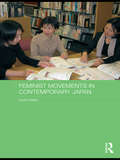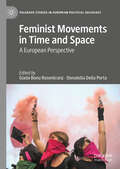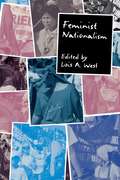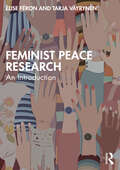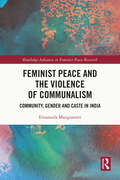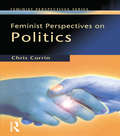- Table View
- List View
Feminist Foreign Policy Analysis: A New Subfield
by Karen E. Smith Carol Cohn Rebecca Tiessen Claire Duncanson Fiona Robinson Jennifer Thomson Katarzyna Jezierska Klaus Brummer Elsa Hedling Ann Towns Annika Bergman Rosamond Ekatherina Zhukova Daniela Philipson Garcia Victoria Scheyer Columba Achilleos-Sarll Khushi Singh Rathore Katherine A.M. Wright Roberta Guerrina Farkhondeh AkbariHow can feminist scholarship advance the field of foreign policy analysis to better understand contemporary foreign policy actions and challenges? This groundbreaking book provides the state-of-the-art in the study of gender, feminisms and foreign policy. Bringing together contributors from around the world, chapters offer new analyses of foreign policy topics, including diplomacy, trade, defence, environment, peacebuilding, disinformation and development assistance. The book advances new theories, concepts and empirical knowledge for the emerging field of feminist foreign policy analysis. The book stands as a vital resource for scholars, students and practitioners seeking to understand and respond to the multifaceted gendered dynamics of global politics.
Feminist Foreign Policy in Theory and in Practice: An Introduction
by Stephenie Foster Susan A. MarkhamFeminist Foreign Policy in Theory and in Practice outlines the foundations of feminist foreign policy and the fundamental concepts discussed and utilized by governments, civil society organizations, and those in the academic community as they define, formulate, and implement it. This book furthers the global conversation around how countries can develop and execute approaches to foreign policy and national security that go beyond conflict prevention and resolution and use a feminist or gender lens to increase gender equality and women's leadership in the security sector. It reviews how governments have implemented feminist foreign, development, and trade policies at the multilateral and national levels, and sets forth the unique global role of the U.S. government, using case studies to discuss what would be needed to implement a feminist foreign policy in the U.S. The authors provide a roadmap, stressing the necessity of applying a gender analysis and perspective to all peace and security decision-making and involving women in all aspects of conflict prevention and resolution, peacebuilding, post-conflict reconstruction, and humanitarian relief. They tie together the movements for human rights, women’s rights, feminism, and peace and security, highlighting how each of these strands brings key perspectives to the study of foreign policy. This book complements the study of the women, peace, and security agenda. It will be of great use to practitioners, including government officials, addressing issues of foreign policy, multilateral and bilateral engagement, and the promotion of gender equality and social inclusion. It will also be of interest to students and scholars of foreign policy, security studies, international relations, gender studies, development, governance, and political science.
Feminist Framing of Europeanisation: Gender Equality Policies in Turkey and the EU (Gender and Politics)
by Rahime Süleymanoğlu-Kürüm F. Melis Cin‘Bridging European and gender studies, this volume deserves a great welcome to the literature. It not only offers a feminist reading of Europeanisation in general, but also discusses the process of Europeanisation and de-Europeanisation of Turkey with regard to changes in gender policy. The book demonstrates that the EU is the leading body to advocate gender equality, and also proves that it is a firm gender actor compared to other international organisations. However, as the volume also shows, the EU is not yet a normative gender actor due to the absence of a feminist rationale in promoting gender equality abroad. The contributions offer significant insights into EU-Turkey relations from a gender studies perspective.’ Ayhan Kaya, Professor of Politics and Jean Monnet Chair for European Politics of Interculturalism, Istanbul Bilgi University, Turkey‘Süleymanoğlu-Kürüm and Cin have curated a timely volume that applies a feminist lens to the well-known Europeanisation framework. Using the case of Turkey, the book extends the focus of European studies scholarship that analyses the adaptation of non-member states to EU policies and practices to setting a new feminist agenda in the adaptation to the EU. Beyond the new insights offered on the Turkish case study, the volume provides a powerful critique, and highlights the limits of the EU’s reach outside of its current border.’ Toni Haastrup, Senior Lecturer in International Politics, University of Stirling, UK‘This pioneering volume, which extends feminist perspectives to the study of EU toward candidate countries, is a must-read for scholars of EU integration and gender studies.’ Bahar Rumelili, Professor and Jean Monnet Chair at the Department of International Relations, Koc University, TurkeyThis book explores the Europeanisation of gender policies and addresses some of the challenges of the debates surrounding the EU’s impact on domestic politics. Using Turkey as a case study, it illustrates that Europeanisation needs a feminist agenda and perspective. The first part of the book critically engages with the literature on Europeanisation, the EU’s gender policies and gender policymaking, and the interaction between Europeanisation and gender policies to argue that the Europeanisation framework falls short in devising sustainable gender policies due to a lack of feminist rationale and theory. Subsequently, the book develops a feminist framework of Europeanisation by drawing on the work of key feminist philosophers (Carole Pateman, Onora O’Neill, Nancy Fraser, Anne Phillips, Iris Young) and uses this framework to offer a critique of the Europeanisation of gender policies in various areas where the EU has prompted changes to domestic policies, including in civil society, political representation, private sector, violence against women, education, and asylum policy.
Feminist Heidegger: Sex, Gender, and the Politics of Birth (SUNY series in Contemporary Continental Philosophy)
by Jill DrouillardA feminist reading of how Heidegger may have responded to an unanswered questioned he posed in 1923, "Problem: What is woman?" while using his thought to better understand how contemporary society replies to questions in the realms of law, bioethics, pedagogy, and politics.This book begins with an unexplored and unanswered question that Martin Heidegger raises in a 1923 Freiburg course: "Problem: What is woman?" Yet, why should we care that Heidegger raises this "problem"? What could he, a member of the National Socialist Party, help feminists understand about responding to "the woman question"? How can Heidegger help us understand our own historical climate in which this question continues to hold significance? Jill Drouillard divides Heidegger's thought into two categories to think about the sexed/gendered experiences that coordinate our birth: (1) the one that suspends "the woman question" and that provides useful resources for thinking the fluidity of sex/gender, and (2) the one that provides a totalized reply to this query by manipulating tropes of the feminine to advance a politico-poetic project of Nazi politics. She uses Heidegger as a cautionary tale to demonstrate the harm that occurs when society tries to define the being (or "what is") of woman in any definite sense. In some chapters, she teases apart how Heidegger may have offered a reply to "the woman question" and, in others, shows what happens in today's society when law, bioethics, politics, and pedagogy reckon with this query.
Feminist History of Philosophy: The Recovery And Evaluation Of Women's Philosophical Thought
by Eileen O’Neill Marcy P. LascanoOver the course of the past twenty-five years, feminist theory has had a forceful impact upon the history of Western philosophy. The present collection of essays has as its primary aim to evaluate past women’s published philosophical work, and to introduce readers to newly recovered female figures; the collection will also make contributions to the history of the philosophy of gender, and to the history of feminist social and political philosophy, insofar as the collection will discuss women’s views on these issues.The volume contains contributions by an international group of leading historians of philosophy and political thought, whose scholarship represents some of the very best work being done in North and Central America, Canada, Europe and Australia.
Feminist IR in Europe: Knowledge Production in Academic Institutions (Trends in European IR Theory)
by Maria Stern Ann E. TownsThe aim of this open access book is to take stock of, critically engage, and celebrate feminist IR scholarship produced in Europe. Organized thematically, the volume highlights a wealth of excellent scholarship, while also focusing on the politics of location and the international political economy of feminist knowledge production. Who are some of the central feminist scholars located in Europe? How might the concentration of these scholars in Northern Europe and the UK shape the contents of their scholarship? What have some of the main contributions been, in the study of the following themes: security; war and military; peace; migration; international political economy and development; foreign policy; diplomacy; and global governance and international organizations? The volume offers both an intellectual history and a sociology of feminist IR scholarship in Europe. It showcases the vitality and breadth of feminist IR traditions, while simultaneously calling attention to their partial nature, exclusions and silences.
Feminist Identity Development and Activism in Revolutionary Movements
by Theresa O’KeefeThis book examines how many women active in revolutionary movements develop feminist identities and how this identity simultaneously contributes to and conflicts with the struggle for women's emancipation.
Feminist International Relations Through a Technospatial Lens: An Interdisciplinary Approach
by Gillian YoungsFeminist International Relations Through a Technospatial Lens is a rich, thought-provoking and wide-ranging assessment of power and empowerment in the digital age.Artificial intelligence (AI) innovations have launched a new era of policy and public engagement with the workings of digital economy and the scale of its possibilities and risks. How beneficial will its data-driven technological advances be across scientific, medical and commercial sectors and what are the dangers of its increasing capacities to replace human presence and interactions with convincing replications? These are the kinds of big new questions societies confront. Answers will need to draw on deep understanding of technospatial and technosocial dimensions of digital economy and how it has extended, deepened and transformed automation as a continuing feature of earlier industrial economy transitions. These are the central themes addressed in this book, which presents a new analysis supported by a range of material related to more than a quarter of a century of Gillian Youngs’ applied research and practice on power and empowerment in the digital world. The book examines the complex masculinist abstractions and structures that have framed technology as intrinsic to the momentum of change in unquestioned ways in political economy and its state and market drivers, including in research, policy, corporate and profit-driven strategies. To transcend these abstractions and open up pathways for full sociotechnical interrogation of the promise and hazards of advances such as AI, the author’s distinctive critical approach combines insights from feminist theory and practice, political economy and media and communications.Contributing to advancing feminist international relations and consolidating its distinctive place in cutting-edge social and political science, this book will speak to scholars and students of international relations, politics, women’s and gender studies, as well as geography, sociology and media and communications.
Feminist International Relations: 'Exquisite Corpse' (Interventions)
by Marysia ZalewskiThis book offers a contemporary intervention in the field of feminism/international relations. Partly inspired by Surrealism, the book is written in a series of vignettes and draws on a variety of approaches inviting readers in to inhabit the text. It is a politically engaged book, though one which does not direct readers in conventional ways, visiting global politics, the classroom, poetry, institutional violence, cartoons, feminist violence, films, violent white men, angry black women, blood and ‘English’ puddings. Working imaginatively with epistemology and methodology, and embedding theory throughout the text, the book can be considered part of the current genre of scholarship which attends to complexity, uncertainty, disruption, affect and the creative possibilities of randomness. Feminist International Relations: Exquisite Corpse will be of interest to students and scholars of International Politics, Gender and Feminist Studies, International Studies, Political Theory, Globalization Studies and further afield.
Feminist International: How to Change Everything
by Veronica GagoLeader of Latin America&’s powerful new women&’s movement rethinks the meaning of feminist politicsRecent years have seen massive feminist mobilizations in virtually every continent, overturning social mores and repressive legislation. In this brilliant and original look at the emerging feminist international, Verónica Gago explores how the women&’s strike, as both a concept and collective experience, may be transforming the boundaries of politics as we know it.At once a gripping political analysis and a theoretically charged manifesto, Feminist International draws on the author&’s rich experience with radical movements to enter into ongoing debates in feminist and Marxist theory: from social reproduction and domestic work to the intertwining of financial and gender violence, as well as controversies surrounding the neo-extractivist model of development, the possibilities and limits of left populism, and the ever-vexed nexus of gender-race-class. Gago asks what another theory of power might look like, one premised on our desire to change everything.
Feminist Interpretations of John Rawls (Re-Reading the Canon)
by Ruth AbbeyIn Feminist Interpretations of John Rawls, Ruth Abbey collects eight essays responding to the work of John Rawls from a feminist perspective. An impressive introduction by the editor provides a chronological overview of English-language feminist engagements with Rawls from his Theory of Justice onward. Abbey surveys the range of issues canvassed by feminist readers of Rawls, as well as critics’ wide disagreement about the value of Rawls’s corpus for feminist purposes. The eight essays that follow testify to the continuing ambivalence among feminist readers of Rawls. From the perspectives of political theory and moral, social, and political philosophy, the contributors address particular aspects of Rawls’s work and apply it to a variety of worldly practices relating to gender inequality and the family, to the construction of disability, to justice in everyday relationships, and to human rights on an international level. The overall effect is to give a sense of the broad spectrum of possible feminist critical responses to Rawls, ranging from rejection to adoption.Aside from the editor, the contributors are Amy R. Baehr, Eileen Hunt Botting, Elizabeth Brake, Clare Chambers, Nancy J. Hirschmann, Anthony Simon Laden, Janice Richardson, and Lisa H. Schwartzman.
Feminist Interpretations of John Rawls: Feminist Interpretations Of John Rawls (Re-Reading the Canon)
by Ruth AbbeyIn Feminist Interpretations of John Rawls, Ruth Abbey collects eight essays responding to the work of John Rawls from a feminist perspective. An impressive introduction by the editor provides a chronological overview of English-language feminist engagements with Rawls from his Theory of Justice onward. Abbey surveys the range of issues canvassed by feminist readers of Rawls, as well as critics’ wide disagreement about the value of Rawls’s corpus for feminist purposes. The eight essays that follow testify to the continuing ambivalence among feminist readers of Rawls. From the perspectives of political theory and moral, social, and political philosophy, the contributors address particular aspects of Rawls’s work and apply it to a variety of worldly practices relating to gender inequality and the family, to the construction of disability, to justice in everyday relationships, and to human rights on an international level. The overall effect is to give a sense of the broad spectrum of possible feminist critical responses to Rawls, ranging from rejection to adoption.Aside from the editor, the contributors are Amy R. Baehr, Eileen Hunt Botting, Elizabeth Brake, Clare Chambers, Nancy J. Hirschmann, Anthony Simon Laden, Janice Richardson, and Lisa H. Schwartzman.
Feminist Interpretations of Mary Astell (Re-Reading the Canon)
by Penny A. Weiss Alice SowaalOften referred to as a proto-feminist, early modern English philosopher and rhetorician Mary Astell was a pious supporter of monarchy who wrote about gender equality at a time when society tightly constrained female agency. This diverse collection of essays situates her ideas in feminist, historical, and philosophical contexts. Focusing on Astell’s work and thought, this book explores the degree to which she can be considered a “feminist” in light of her adherence to Cartesianism, Christian theology, and Tory politics. The contributors explore the philosophical underpinnings of Astell’s outspoken advocacy for the autonomy and education of women; examine the intricacies underlying her theories of power, community, and female resistance to unlawful authority; and reveal the similarities between her own philosophy of gender and sexual politics and feminist theorizing today.A broad-ranging look at one of the most important female writers of the seventeenth and eighteenth centuries, this volume will be especially valuable to students and scholars of feminist history and philosophy and the early modern era.Aside from the editors, the contributors are Kathleen A. Ahearn, Jacqueline Broad, Karen Detlefsen, Susan Paterson Glover, Marcy P. Lascano, Elisabeth Hedrick Moser, Christine Mason Sutherland, and Nancy Tuana.
Feminist Interpretations of Plato
by Nancy TuanaThe essays in this anthology explore the full spectrum of Plato's philosophy and are representative of the variety of perspectives within feminist criticism. The essays in the first section focus primarily on Plato's social and political theory, and in particular the place of women within the state. The second section concentrates on examining the role of the feminine within Plato's metaphysics and epistemology. Tuana introduces both sections and a detailed bibliography is included.
Feminist Interpretations of Thomas Hobbes
by Nancy J. Hirschmann Joanne H. WrightFeminist Interpretations of Thomas Hobbes features the work of feminist scholars who are centrally engaged with Hobbes’s ideas and texts and who view Hobbes as an important touchstone in modern political thought. Bringing together scholars from the disciplines of philosophy, history, political theory, and English literature who embrace diverse theoretical and philosophical approaches and a range of feminist perspectives, this interdisciplinary collection aims to appeal to an audience of Hobbes scholars and nonspecialists alike. As a theorist whose trademark is a compelling argument for absolute sovereignty, Hobbes may seem initially to have little to offer twenty-first-century feminist thought. Yet, as the contributors to this collection demonstrate, Hobbesian political thought provides fertile ground for feminist inquiry. Indeed, in engaging Hobbes, feminist theory engages with what is perhaps the clearest and most influential articulation of the foundational concepts and ideas associated with modernity: freedom, equality, human nature, authority, consent, coercion, political obligation, and citizenship. Aside from the editors, the contributors are Joanne Boucher, Karen Detlefsen, Karen Green, Wendy Gunther-Canada, Jane S. Jaquette, S. A. Lloyd, Su Fang Ng, Carole Pateman, Gordon Schochet, Quentin Skinner, and Susanne Sreedhar.
Feminist Interpretations of Thomas Hobbes (Re-Reading the Canon)
by Nancy J. Hirschmann Joanne H. WrightFeminist Interpretations of Thomas Hobbes features the work of feminist scholars who are centrally engaged with Hobbes’s ideas and texts and who view Hobbes as an important touchstone in modern political thought. Bringing together scholars from the disciplines of philosophy, history, political theory, and English literature who embrace diverse theoretical and philosophical approaches and a range of feminist perspectives, this interdisciplinary collection aims to appeal to an audience of Hobbes scholars and nonspecialists alike.As a theorist whose trademark is a compelling argument for absolute sovereignty, Hobbes may seem initially to have little to offer twenty-first-century feminist thought. Yet, as the contributors to this collection demonstrate, Hobbesian political thought provides fertile ground for feminist inquiry. Indeed, in engaging Hobbes, feminist theory engages with what is perhaps the clearest and most influential articulation of the foundational concepts and ideas associated with modernity: freedom, equality, human nature, authority, consent, coercion, political obligation, and citizenship.Aside from the editors, the contributors are Joanne Boucher, Karen Detlefsen, Karen Green, Wendy Gunther-Canada, Jane S. Jaquette, S. A. Lloyd, Su Fang Ng, Carole Pateman, Gordon Schochet, Quentin Skinner, and Susanne Sreedhar.
Feminist Interpretations of Thomas Hobbes (Re-Reading the Canon)
by Nancy J. Hirschmann and Joanne H. WrightFeminist Interpretations of Thomas Hobbes features the work of feminist scholars who are centrally engaged with Hobbes’s ideas and texts and who view Hobbes as an important touchstone in modern political thought. Bringing together scholars from the disciplines of philosophy, history, political theory, and English literature who embrace diverse theoretical and philosophical approaches and a range of feminist perspectives, this interdisciplinary collection aims to appeal to an audience of Hobbes scholars and nonspecialists alike.As a theorist whose trademark is a compelling argument for absolute sovereignty, Hobbes may seem initially to have little to offer twenty-first-century feminist thought. Yet, as the contributors to this collection demonstrate, Hobbesian political thought provides fertile ground for feminist inquiry. Indeed, in engaging Hobbes, feminist theory engages with what is perhaps the clearest and most influential articulation of the foundational concepts and ideas associated with modernity: freedom, equality, human nature, authority, consent, coercion, political obligation, and citizenship.Aside from the editors, the contributors are Joanne Boucher, Karen Detlefsen, Karen Green, Wendy Gunther-Canada, Jane S. Jaquette, S. A. Lloyd, Su Fang Ng, Carole Pateman, Gordon Schochet, Quentin Skinner, and Susanne Sreedhar.
Feminist Manifestos: A Global Documentary Reader (Biopolitics)
by Penny A WeissA wide-reaching collection of groundbreaking feminist documents from around the worldFeminist Manifestos is an unprecedented collection of 150 documents from feminist organizations and gatherings in over 50 countries over the course of three centuries. In the first book of its kind, the manifestos are shown to contain feminist theory and recommend actions for change, and also to expand our very conceptions of feminist thought and activism. Covering issues from political participation, education, religion and work to reproduction, violence, racism, and environmentalism, the manifestos together challenge simplistic definitions of gender and feminist movements in exciting ways. In a wide-ranging introduction, Penny Weiss explores the value of these documents, especially how they speak with and to each other. In addition, an introduction to each individual document contextualizes and enhances our understanding of it.Weiss is particularly invested in how communities work together toward social change, which is demonstrated through her choice to include only collectively authored texts. By assembling these documents into an accessible volume, Weiss reveals new possibilities for social justice and ways to advocate for equality.A unique and inspirational collection, Feminist Manifestos expands and evolves our understanding of feminism through the self-described agendas of women from every ethnic group, religion, and region in the world.
Feminist Methodologies: Experiments, Collaborations and Reflections (Gender, Development and Social Change)
by Wendy Harcourt Karijn van den Berg Constance Dupuis Jacqueline GayborThis open access book gives insights into feminist methodologies in theory and practice. By foregrounding the experiential and embodied nature of doing feminist research, this book offers valuable tools for feminist research as a continuous praxis. Emerging from a rich collective learning process, the collection offers in-depth reflections on how feminists shape research questions, understand positionality, share research results beyond academe and produce feminist intersectional knowledges. This book reveals how the authors navigate theory and practice, candidly exploring the difficulty of producing knowledge on the edge of academia and activism. From different points of view, places and disciplinary positions, artistic and creative experiments and collaborations, the book provides a multi-layered analysis. This book will be a valuable resource and asset to early career researchers and interdisciplinary feminist students who can learn more about the doing of feminist research from realistic, accessible, and practical methodological tools and knowledge.
Feminist Movements in Contemporary Japan (ASAA Women in Asia Series)
by Laura DalesIn contemporary Japan there is much ambivalence about women’s roles, and the term "feminism" is not widely recognised or considered relevant. Nonetheless, as this book shows, there is a flourishing feminist movement in contemporary Japan. The book investigates the features and effects of feminism in contemporary Japan, in non-government (NGO) women’s groups, government-run women’s centres and the individual activities of feminists Haruka Yoko and Kitahara Minori. Based on two years of fieldwork conducted in Japan and drawing on extensive interviews and ethnographic data, it argues that the work of individual activists and women’s organisations in Japan promotes real and potential change to gender roles and expectations among Japanese women. It explores the ways that feminism is created, promoted and limited among Japanese women, and advocates a broader construction of what the feminist movement is understood to be and a rethinking of the boundaries of feminist identification. It also addresses the impact of legislation, government bureaucracy, literature and the internet as avenues of feminist development, and details the ways which these promote agency – the ability to act – among Japanese women.
Feminist Movements in Time and Space: A European Perspective (Palgrave Studies in European Political Sociology)
by Donatella Della Porta Giada Bonu RosenkranzThis volume provides a broad analysis of feminist movements--both historical and present-day--in Europe. It will fill the gap in the literature on feminist mobilizations through a systematic analysis of European third wave feminism from a cross-national perspective (covering Denmark, France, Greece, Italy, Poland, Slovenia, Spain, and Turkey) and a cross-time perspective (covering the time frame 2010-2021). In doing this, the authors also single out the different constellations of feminist movements as related to specific national political opportunities and networks of alliance and opposition. This book will be of interest to students and scholars in gender studies, feminist theory, and social movement studies.
Feminist Nationalism
by Lois A. WestFeminist Nationalism demonstrates how feminism is redefining nationalism by presenting case studies from Europe, the Middle East, Africa, Asia and the Americas. Consisting of social movements and cultural ideologies, feminist nationalism links struggles for women's rights with struggles for group identity rights and/or national sovereignty in their goals of self-determination. Many analyses of nationalism assume it is identical for women and men in its definition and operation. This collection challenges that framework by placing women at the center and demonstrating how feminism is redefining nationalism both in particular cases and in the global context.
Feminist Peace Research: An Introduction
by Tarja Väyrynen Élise FéronThis textbook provides a comprehensive overview of the field of gender, feminism and peace.It is based on the argument that feminist thinking is necessary to understand and analyse the core issues in peace and conflict studies and is fundamental to thinking about solutions to global problems and to promoting peaceful conflict transformation. The book centres alternative and critical approaches missing in mainstream peace research and brings forward feminist perspectives on traditional peace research topics such as militarism, peacekeeping, arms trade and the articulation of different forms of violence. It also advances critical and alternative issues and topics that traditional peace research has sidelined, including, for example, artificial intelligence, technologies and peace; trauma and memory; human–non-human species relations; art; popular culture; post-colonial and decolonial feminist perspectives; and the queering of war and peace. In sum, this textbook contributes to the visibility of these feminist critical approaches to peace research and makes them accessible to scholars and students interested in the subject.This book will be of much interest to students of peace studies, feminist theory, gender studies and International Relations.
Feminist Peace and the Violence of Communalism: Community, Gender and Caste in India (Routledge Advances in Feminist Peace Research)
by Emanuela MangiarottiThis book examines how narratives of communal conflicts in south India affect Muslims, women, and the lower castes, entrenching complex realities of marginalisation and violence.Through extensive empirical research, it traces a thread connecting the history of communalism in the south Indian city of Hyderabad with the reality of everyday life in so-called “riot-prone” neighbourhoods. The chapters move between political discourse and daily life, bringing attention to how minority voices navigate and mould the space of interfaith relations and community belonging, and emphasising their political significance within a context dominated by narratives of communal conflicts. The book concludes with a reflection on the entanglements of dominant conflict paradigms and the lived experience of marginality across multiple axes of difference, positioning this interplay as crucial for understanding the multiple dimensions of political violence in contemporary societies.This book will be of much interest to students of feminist peace research, political violence, Asian studies, and International Relations.
Feminist Perspectives on Politics (Feminist Perspectives)
by Chris CorrinFeminist Perspectives on Politics considers how feminist perspectives have considerably broadened the scope of what is considered 'political'. Themes and issues covered range from nineteenth century debates around women's equality and liberation, to twentieth century arguments and activities towards gaining a more nuanced understanding of women's differences and diversity. ' Difference' remains a key term in contemporary feminisms, and the author examines debates engendered from women's liberation politics to open up discussion of Black feminisms, lesbian politics and disabled feminist agendas. Formal political participation and the impact of women's movement politics are assessed in global comparisons as are the debates surrounding discourses on 'development' and transnational politics, and the influence of women at local, national and international levels. The book will be essential reading for students at all levels across the fields of Politics, Women's Studies, Sociology, History, Cultural Studies, Political Economy and 'Development' Studies more generally (such as in studies concerned with anti-racism, gender, social policy and the history of ideas within educational institutions, local government and voluntary organisations)
